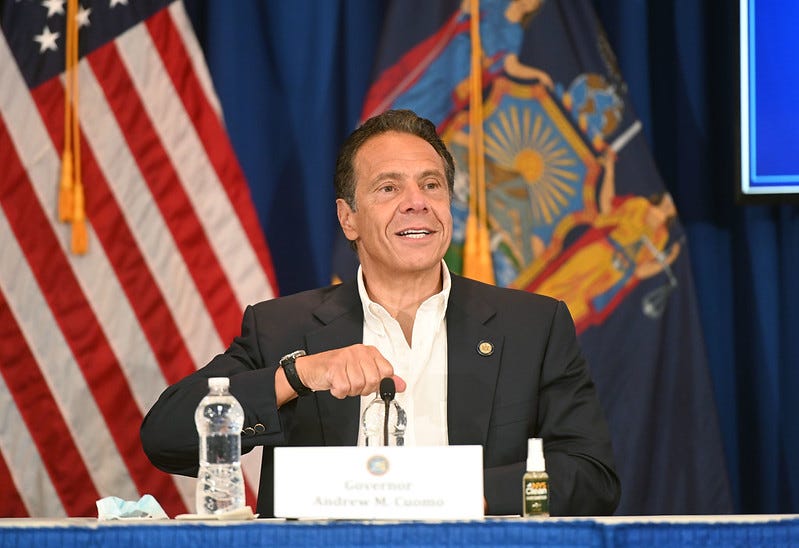Democrats Tried to Take Legal Immunity Away from Hospitals and Nursing Homes. Lobbyists, with Cuomo's Help, May Stop Them.
Efforts to strip the controversial immunity provision are running into roadblocks in Albany, as lobbying groups mobilize to rewrite bill language.

This week, the State Legislature has reconvened for a special session to pass a host of bills that have been bottled up for months. Depending on your perspective, the session is either an outburst of much-needed democracy or “much ado about nothing,” in the words of one assembly member. In profiling the flurry of activity, I spoke with those involved in a piece of legislation that sought, initially, to repeal the controversial immunity provision granted to nursing homes and hospitals in the wake of the coronavirus outbreak in March.
The repeal had been a top priority for progressives in the chamber, particularly outspoken critics of Governor Andrew Cuomo, like Assemblyman Ron Kim of Queens and State Senator Alessandra Biaggi of the Bronx. The goal of these lawmakers and their allies, as well as those who lost loved ones in nursing homes, was to be able to have the power to seek legal recourse against those healthcare facilities that, through negligence or malpractice, allowed residents to unnecessarily die. To date, more than 6,000 New Yorkers have died in nursing homes statewide, a count that very likely understates the mass death: New York, for reasons never entirely clear, doesn’t count those who get sick in nursing homes and die in hospitals as nursing home deaths. One healthcare expert told me, in research for a story, that it’s possible New York is undercounting nursing home deaths by 30 or 40 percent. Cuomo’s directive of forcing nursing homes to readmit coronavirus patients may have played a significant role in the spread of the virus, as well as the state’s general refusal to heed calls for more PPE.
The immunity provision came with the state budget passed in haste at the start of April. Lobbyists from the Greater New York Hospital Association, the incredibly powerful nonprofit arm representing hospitals and healthcare facilities across New York, helped write and insert the language into the state budget, according to lawmakers close to the process. GNYHA is very close to Cuomo; the group has been one of the largest donors to the State Democratic Party, which Cuomo controls, and Cuomo himself.
This week, GNYHA is fighting to change legislation in the Democrat-controlled chambers that would have scrapped the immunity provision altogether. It appears they will get their wish: a bill is expected to pass on Thursday that would make the immunity provision repeal prospective, not retroactive. Those close to the bill-drafting process say GNYHA is shaping the language. The co-sponsor in the State Senate is no longer Biaggi, one of Cuomo’s fiercest critics, who had the bill taken from her by the chamber’s leadership; it’s now a Bronx state senator, Luis Sepulveda.
What is the difference between a prospective and retroactive bill? Quite simply, if you lost a loved one in a nursing home or healthcare facility already and want to sue, you’ll still be blocked. The bill would only apply to future cases and would not go into effect until Cuomo signs it into law. In Albany, Cuomo exerts inordinate power over this process by “calling up” bills he intends to sign. If the legislature passes a bill in July, Cuomo can sign very soon or wait until the end of the year. By waiting to sign even this watered down bill, Cuomo could effectively grant nursing homes immunity for the entirety of 2020.
It’s important to not hold legislative leaders blameless here. With few exceptions, both Speaker Carl Heastie and Senate Majority Leader Andrea Stewart-Cousins have repeatedly deferred to Cuomo since the pandemic began, handing him sweeping new emergency powers and the ability to slash the state budget on a rolling basis. This week, Heastie and Stewart-Cousins will not push Cuomo on raising taxes to help offset a looming budget shortfall and address the state’s housing and unemployment crises. Rather, they tow the Cuomo line that the Donald Trump administration must bail us all out first. In another world, this would be the right thing to do—a sane federal government would authorize massive tranches of aid to save the states—but we don’t have a cooperative government in Washington. New York must help itself first.
As Cuomo continues to soar, declaring victory over the virus despite 32,000 deaths statewide, the nursing home issue will persist. Families of victims are not giving up. Legislative hearings are set for early August. For now, much of the outrage, beyond some progressives in Albany, is coming from conservatives. For Cuomo to pay a political price in the state he controls, it will have to come from everywhere.

